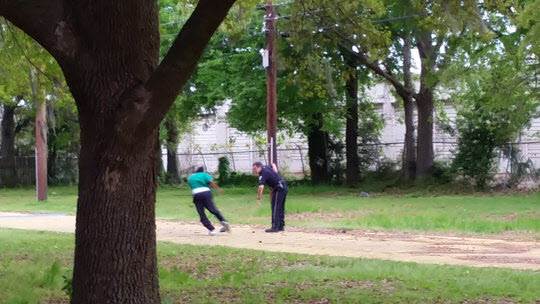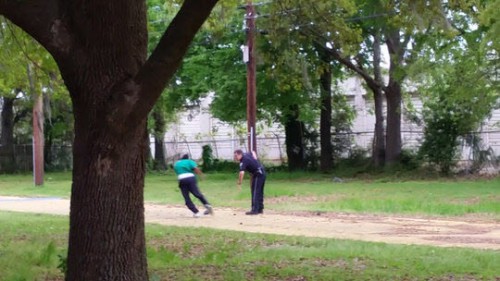

Back in December, a Charleston jury deadlocked in the case of Michael Slager, who shot and killed Walter Scott. The jury hung 11-1 for guilt, forcing the mistrial.
The case happened on April 4, 2015, when then-Officer Slager pulled over Walter Scott in what was a routine traffic stop. There was a confrontation that was not caught on camera, Mr. Scott fled and Mr. Slager shot him five times in the back.
Mr. Slager then concocted his defense that they had a confrontation and Mr. Scott had grabbed a Taser and attempted to use it on the officer, forcing him to shoot and kill him. But unbeknownst to Officer Slager, a bystander filmed the encounter and caught Slager handcuffing Mr. Scott and moving the Taser that had fallen from his belt close to Scott’s hand.
The New York Daily News, in one of the more pointed editorials that came out at the time of the trial, blasted the decision, “It is not the practice of this editorial page to assert the guilt or innocence of an individual accused of a crime. But the video evidence in this case was so compelling, so unequivocal, it demands departure from those norms.”
Yesterday, the situation was rectified somewhat when Officer Slager, 35, pled guilty to a federal civil rights offense in the shooting.
The guilty plea took place in the U.S. District Court for the District of South Carolina. According to a release from the US Department of Justice, “The plea will resolve both the federal and the state cases pending against Michael Slager. Prior to entry of the guilty plea, jury selection in the federal trial had been scheduled to begin on May 9, and a state trial had been set for August.”
According to documents filed in connection with the guilty plea, Michael Slager, while acting as a North Charleston Police Department (NCPD) officer, “willfully used deadly force on Walter Scott even though it was objectively unreasonable under the circumstances.
“Slager had stopped Scott’s vehicle after observing that a brake light was not working. During the stop, Scott fled on foot and Slager pursued him. During the foot chase, Slager deployed his Taser and Scott fell to the ground. Scott managed to get off of the ground and again run away.
“Scott was unarmed and running away when (Slager) fired eight shots at him from his department-issued firearm. Five shots hit Scott, with all of the bullets entering from behind. Scott died as a result of the injuries from Slager’s gunshots.”
“The Department of Justice will hold accountable any law enforcement officer who violates the civil rights of our citizens by using excessive force,” said Attorney General Sessions.
He added, “Such failures of duty not only harm the individual victims of these crimes; they harm our country, by eroding trust in law enforcement and undermining the good work of the vast majority of honorable and honest police officers. As our Department works to support the courageous and professional law enforcement personnel who risk their lives every day to protect us, we will also ensure that police officers who abuse their sacred trust are made to answer for their misconduct.”
“Our hearts are with the Scott family today. They have persevered in their quest for justice for their loved one, and I hope that today brings them a measure of closure,” said U.S. Attorney Drake. “I also want to thank both Solicitor Wilson of the Ninth Judicial Circuit and South Carolina Law Enforcement Division [SLED] Chief Mark Keel for their efforts to secure justice in this matter.”
“The resolution of this investigation protects the integrity of law enforcement, maintains the confidence of the community, and ensures justice is served in a fair and impartial manner,” said Special Agent in Charge Norris. “The cooperation between the South Carolina Law Enforcement Division, the U.S. Attorney’s Office, the Charleston County Solicitor’s Office, the Civil Rights Division, and the FBI Columbia Division was paramount in bringing this case to a successful conclusion.”
“This conviction is a prime example of the strong results we can get when federal and state authorities work together,” said Solicitor Wilson. “We are grateful for the Department of Justice for their role in obtaining justice for the Scotts with this conviction and in moving our community forward through their hard work.”
“SLED’s role in any criminal investigation is to discover the facts of the case and report them,” said Chief Keel. “For the men and women of SLED, working closely with our partners in the Ninth Circuit Solicitor’s Office, the U.S. Department of Justice, the FBI and the U.S. Attorney’s Office, today’s plea is the culmination of our collaboration.”
“This disposition is the product of the excellent work of state and local law enforcement. I am proud of the leadership of U.S. Attorney Beth Drake and the critical work of the FBI. The teamwork in this case represents the best in law enforcement,” added Attorney General Sessions.
Observers widely expect Mr. Slager to do considerable time for this offense. According to the DOJ release, “Slager faces a maximum sentence of life in prison for the federal civil rights violation, as well as a potential $250,000 fine.”
But Tuesday was a mixed day for justice in police shootings. The DOJ announced that two white Baton Rouge police officers will not face federal charges for the July 2016 death of Alton Sterling.
According to published accounts, the two white officers were arresting Mr. Sterling after responding to a call about an armed man. Mr. Sterling was pinned to the ground when at least one of the officers shot him.
At the time of death there were mixed signals, with some criticizing the officers for reportedly having their body cameras “’fall off’ during the incident.”
Others, like Radley Balko of the Washington Post, called Mr. Sterling’s death “legal and preventable.”
Mr. Sterling was wearing red and allegedly had a gun in his pocket. Witnesses however, described the cops to be aggressive from the start and reported that Mr. Sterling was complying with the officers, was not holding the gun, nor did he have his hand near the gun.
Mr. Balko writes, “In the video, one of Sterling’s hands is clearly not a threat, but his other hand isn’t visible. There’s also body camera and dash camera footage that has yet to be released.”
From what we know right now, he wrote that “this appears to be another case of police officers deploying lethal force that was likely legal, but was also unnecessary.”
The New York Times this morning notes: “The bar for charging police officers with federal civil rights violations is extremely high, and prosecutions are rare. Even the Obama administration, which cultivated an aggressive reputation on such cases, declined to prosecute officers in several high-profile killings, most notably the 2014 shooting of Mr. Brown, and it saw challenges in bringing charges in Mr. Sterling’s death.”
But for many this will be a reminder that police shootings of black men, which happen all the time, rarely end up with any kind of justice.
—David M. Greenwald reporting


DOJ released a statement that there is no enough evidence to charge either officer with his Sterling’s death.